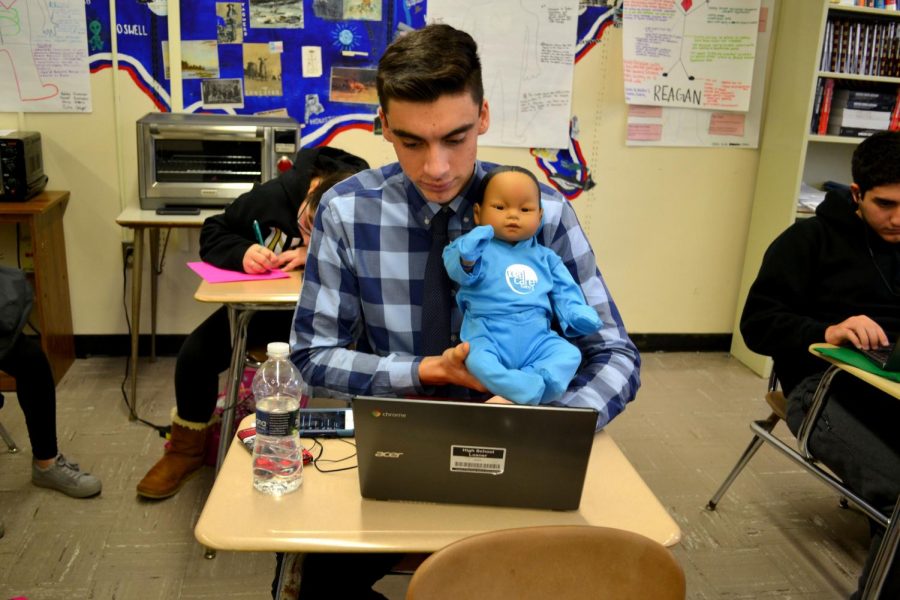‘Babies’ reveal harsh truths of parenting
March 2, 2018
Baby fever has taken over West Essex, and by babies, we mean robotic babies. Starting this year, seniors all over the school can be spotted holding their baby carriers and tending to their “child” during and after the school day. Between diaper changes, feedings and late night tantrums, students are learning the responsibilities and consequences of taking care of a child.
The physical education department introduced this new extra credit health project using RealCare simulation babies, which are meant to mimic live babies. Each student who chooses to participate spends two eventful days with their baby, taking them to class, to work, to practice or anywhere else they may need to go. After hearing about this project being done in other schools and doing careful research, physical education teacher Bettina Plesnitzer decided to test it out with the seniors this year.
“For the students that opt to sign out the baby, they have it for 48 hours and their responsibilities range from full time care, feedings, changings, rocking, burping and more,” Ms. Plesnitzer said. “Upon returning the baby, students will sit with their teacher and receive a printout assessing them on their level of care while the baby was with them.”
The RealCare software that comes with the babies allows educators to evaluate how students react in certain situations regarding the baby’s care. Students wear a wristband that wirelessly tracks their level of care, recording things like temperature and proper positioning of the baby. The physical education teachers have the ability to turn off the babies during a certain time period for sports or other extracurriculars. However, the robotic babies remain on throughout the night to mimic sporadic night time feedings.
The physical education and health teachers introduced this project in order to teach the students responsibility and how to fully care for something. Ms. Plesnitzer said she wanted students to learn how a major change in their life like having a baby would impact their day-to-day scheduling and plans. “It was the worst experience of my life,” senior Nicole Kendall said. “I thought I would sleep through it but it actually woke me up. Still can’t wait to have my own kids though!”
“I think it can [be effective] if students take it seriously and if it’s taken the right way,” English teacher Virginia Dunphy said. “In another district I worked in it went well and I remember them saying how difficult it was to have a baby in their life. I remember babysitting them at lunch time for the kids who didn’t want to bring them to their labs.”
Some prospective participants are up to the challenge while others recognize and shy away from the responsibility that will come with caring for an infant or child.
“I am looking forward to seeing what it is like to wake up at different times to a crying baby and see how I respond,” senior Frank Lagreca said.
“I was going to do it but then I saw everyone struggling so much and decided it wasn’t for me,” senior Bailey Schuster said.
Though the project is currently optional, teachers hope that once they acquire more babies it can be used as a required senior health project in the future.
“From what I’ve heard, when the students return the babies they are glad that their responsibilities have concluded,” Ms. Plesnitzer said. “Most do not anticipate how challenging the care and responsibility of an infant truly is. Some students handle the caretaking better than others, but overall we’ve found that our students are really realizing the purpose of the project.”


